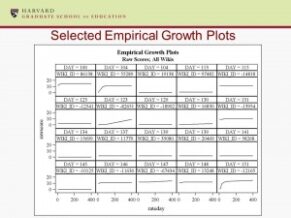 For Immediate Release from EdTechTeacher Co-Director, Justin Reich (also at http://www.
For Immediate Release from EdTechTeacher Co-Director, Justin Reich (also at http://www.
I’m very pleased to announce that the first report from my research project, the Distributed Collaborative Learning Communities project, is published in this month’s issue of Educational Researcher, the flagship journal of the American Educational Research Association. The article can be found through this direct link or at this landing page and is titled, “The State of Wiki Usage in U.S. K-12 Schools: Leveraging Web 2.0 Data Warehouses to Assess Quality and Equality in U.S. K-12 Schools.” I’m very grateful to the Hewlett Foundation’s Open Educational Resources initiative for financial support, and to my co-authors Richard Murnane and John Willett.
A short white paper aimed at educators, with advice for wiki-using teachers emerging from our findings is available here:
The State of Wiki Usage: A Summary for Educators
Abstract:
To document wiki usage in U.S. K–12 settings, this study examined a representative sample drawn from a population of nearly 180,000 wikis. The authors measured the opportunities wikis provide for students to develop 21st-century skills such as expert thinking, complex communication, and new media literacy. The authors found four types of wiki usage: (a) trial wikis and teacher resource-sharing sites (40%), (b) teacher content-delivery sites (34%), (c) individual student assignments and portfolios (25%), and (d) collaborative student presentations and workspaces (1%). Wikis created in schools serving low-income students have fewer opportunities for 21st-century skill development and shorter lifetimes than wikis from schools serving affluent students. This study illustrates the exciting potential that Web 2.0 data warehouses offer for educational research.
Commentary:
My own opinion is that this article makes several important contributions to our understanding of learning technologies in the Web 2.0/networked era. First, as with many who have examined the use of social media in online learning, I am amazed and inspired by the best projects conducted using wikis. In projects like the Flat Classroom Projects, students develop skills in collaboration, cross-cultural communication, media literacy, and critical thinking. Nonetheless, these extraordinary examples appear to be rare peaks in the landscape of social media/peer production usage in school.
Our core substantive findings cohere with results from the last three decades of education technology research: most teachers use wikis to extend existing practices rather than to innovate with new practices (at least through 2010) and wikis are more likely to be used to develop 21st century skills in schools serving wealthy students. From my perspective, these findings show that advocates of social media in the classroom have much work to do if we hope that the potential of these tools can be unleashed broadly in schools.
Methodologically, I hope the paper demonstrates the incredibly exciting potential of online learning environments for educational research. Our research team was capable of studying wikis both in depth, by examining the historical details of every wiki, and at scale, by sampling from hundreds of thousands of learning environments. The instrument we developed, The Wiki Quality Instrument, allowed us to use publicly viewable learning environments to measure opportunities for 21st century skill development across a diverse universe of wiki learning environments. We happened to take an interest in issues specifically related to learning technologies, but in the future, the kinds of analytic techniques have tremendous potential for studying diverse phenomena in education and learning.
Visit EdTechResearcher for more information.

